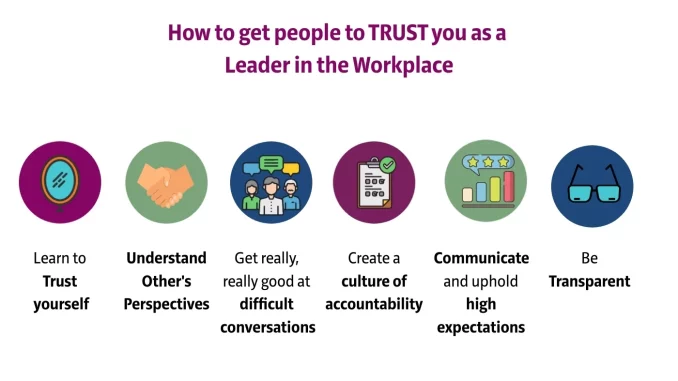
In today’s competitive work environment, technical skills and industry expertise are important for leaders—but they’re not enough. What truly distinguishes a great leader from the rest is the ability to earn and maintain the trust of their employees. Trust is the foundation of productive relationships, cohesive teams, and a healthy workplace culture. Without it, even the most visionary strategies can crumble under the weight of doubt and disengagement.
So, what does it take to be a leader employees trust? It’s not about being perfect. It’s about being authentic, accountable, and committed to your people. Below are key principles and behaviors that build genuine trust with your team.
1. Be Transparent and Honest
Honesty is the bedrock of trust. Employees don’t expect leaders to have all the answers, but they do expect the truth. Whether it’s about the future of the company, performance expectations, or team challenges, transparency breeds confidence. Leaders who hide bad news, sugarcoat problems, or mislead employees risk damaging credibility beyond repair.
Regular, honest communication—especially during times of uncertainty—signals that you respect your team enough to keep them informed and engaged. It also invites dialogue and feedback, strengthening the relationship.
2. Follow Through on Promises
Nothing breaks trust faster than unfulfilled promises. If you tell your team you’ll advocate for resources, recognize their efforts, or address an issue—do it. Being reliable and consistent in your actions reinforces your words and shows that you’re dependable. If circumstances change and you can’t deliver, communicate promptly and explain why.
Following through builds a reputation for integrity, a trait that employees value more than charisma or authority.
3. Show Vulnerability and Humanity
Some leaders mistakenly believe they must always appear strong, composed, and infallible. But trying to project perfection often comes across as inauthentic. Trusted leaders aren’t afraid to admit when they’re wrong or when they don’t know something. They ask questions, seek input, and show they are human.
Demonstrating vulnerability doesn’t weaken your leadership—it strengthens it. It makes you relatable, approachable, and trustworthy. It also encourages employees to be open about their own challenges, creating a culture of psychological safety.
4. Recognize and Appreciate Contributions
Employees are more likely to trust leaders who see and appreciate their work. Recognition doesn’t have to be grand or costly—a simple thank you, shoutout in a meeting, or personal note can go a long way. When people feel valued, their trust in leadership grows.
Additionally, give credit where it’s due. Celebrate team wins, acknowledge individual efforts, and resist the urge to take the spotlight. Trust grows when employees feel their leaders support and elevate them.
5. Be Consistent and Fair
Trustworthy leaders treat everyone with fairness and consistency. They don’t play favorites, change rules arbitrarily, or allow biases to guide decisions. Fair treatment fosters a sense of stability, where employees know what to expect and feel secure in their roles.
This includes holding everyone—yourself included—to the same standards. When team members see that you’re willing to take responsibility for your actions and uphold values without exception, they’re more likely to respect and trust you.
6. Listen Actively
One of the most powerful ways to build trust is to truly listen. Not just hear—but listen. Create space for employees to share ideas, concerns, or feedback without fear of judgment or retaliation. Don’t interrupt, don’t dismiss—just listen.
Leaders who listen send a clear message: “You matter. Your voice matters.” This empowers employees, improves communication, and shows that their perspectives are valued and impactful.
7. Lead by Example
Trust isn’t built through words alone—it’s earned through actions. If you expect punctuality, be on time. If you preach work-life balance, model it. If you promote collaboration, be a team player yourself.
When leaders practice what they preach, they establish credibility. Employees watch what you do more than what you say. Set the tone for the culture you want to see.
8. Support Growth and Development
Employees trust leaders who invest in their future. That means offering opportunities for learning, mentorship, and advancement. It means having career conversations and helping individuals achieve their goals—not just the organization’s.
When leaders actively support personal and professional growth, employees are more engaged, loyal, and trusting. They see leadership as a partner in their journey, not a barrier.
Conclusion
Trust isn’t something you can demand—it’s something you earn through consistent, thoughtful leadership. It requires honesty, humility, empathy, and action. When employees trust their leaders, they are more motivated, collaborative, and resilient. They speak up, step up, and stay.
Being a trusted leader doesn’t mean having all the answers or never making mistakes. It means showing up with integrity, treating people with respect, and leading with both heart and purpose. And when you do that, trust will follow.

Leave a Reply